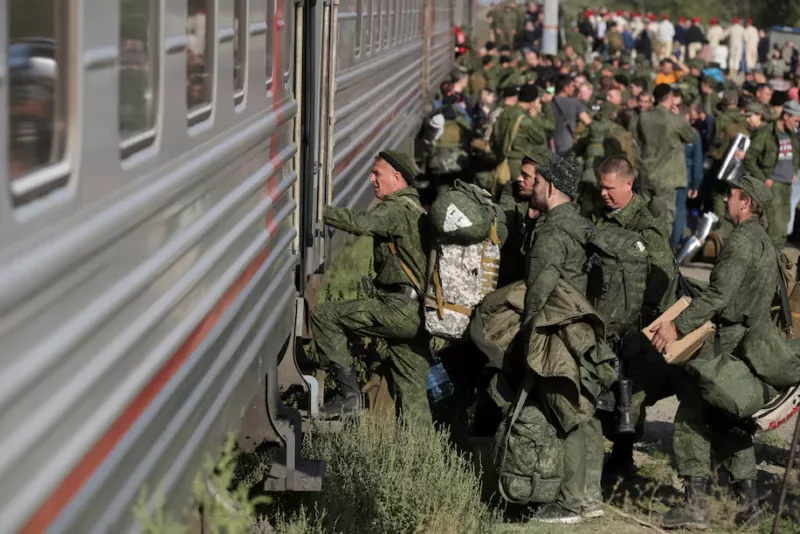
Here’s President Vladimir Putin’s plan to salvage his ruinous mistake of invading Ukraine: Ignore defeat. Redraw the borders. Burn the diplomatic exit ramps. Threaten nuclear war. Do anything but back down.
Think of Putin as a gambler who took the biggest risk of his career when he invaded Ukraine on Feb. 24. None of his big bets have turned out right since, and he has lost nearly every hand. Yet he has chained himself to the table, and he appears ready to wager everything to intimidate his adversaries and make them fold.
Putin’s annexation of four regions in Ukraine, likely to be announced Friday, is a desperation ploy. He may try to dress it up as victory, claiming that he has now achieved the aims of his “special military operation” and can pause for the winter to regroup. Nonsense. This is the most blatantly illegal attempt to seize territory since Adolf Hitler tried to swallow Europe in World War II.
Simple advice to Ukraine and its allies in the United States and Europe: Hunker down. Ride out the short-term pain. Don’t fold, but don’t shoot for the moon, either. Resist the pressure to match Putin’s wild nuclear threats. The truth is that he’s holding a weak hand. The longer he stays in, the worse his situation will become. His compulsive addiction to Ukraine will eventually be fatal. Patience is the West’s secret weapon.
The right strategy now is an updated version of the Cold War approach of “containment”. Draw firm lines. Help Ukraine inflict as much pain on Putin as possible while continuing to avoid a direct U.S.-Russian conflict unless Putin takes the mad step of going nuclear. Let the rot in the Russian system take effect, weakening Putin month by month. Encourage the disintegration of Russian power along its borders — by welcoming Finland and Sweden to NATO and the growing independence of countries such as Kazakhstan, Armenia, Azerbaijan and Kyrgyzstan. Exploit the growing tension between Moscow and Beijing.
To Putin’s annexations through fake referendums, the world should respond: No way! And as nations spurn Putin’s sovereignty claim, they also reject his nuclear threats to protect it. For a kicker, let’s ask the Chinese whether they think an independence referendum in Taiwan would make it independent.
With his takeovers, Putin has burned the diplomatic lifeboats that might have rescued him. Ukrainian President Volodymyr Zelensky, who in March appeared ready to negotiate a deal that would have given Putin working control of Crimea and the Donbas region, now says that after Friday’s expected seizures, there will be nothing to negotiate. Putin might want a frozen conflict, but he will have a hot one. Ukrainian soldiers are still advancing in Kherson, Luhansk and Donetsk. And Ukrainian partisan fighters are killing Russian occupiers and their local puppets every day.
Putin thinks he can outlast the West. He’s convinced that the United States and Europe are decadent and weak, destabilized by the internal political feuds that he himself has covertly encouraged. He has a weirdly unbalanced persecution complex about the West. He sees NATO as an implacable foe that’s determined to humiliate Russia; yet he treats President Biden and other Western leaders with contempt, as weak and indecisive. The West in his mind is at once a lion and a mouse.
Let’s look carefully at Putin’s situation as he takes this latest step of annexing territory and threatening nuclear war if Ukraine tries to take it back. It’s a very fragile position, and all the more dangerous for that.
Putin’s war has broken his social contract with the Russian people. The deal was that if Russians stayed out of politics, Putin would ensure rising standards of living and would stay out of their private lives. That formula has gone bust. The oligarchs have abandoned him; smart young Russians are fleeing the country, if they can; right-wing protesters are ranting on television and left-wing protesters are in the streets.
Putin’s “partial mobilization” of the Russian army has proved a demonstration of everything that’s wrong with the country. Young Russians, the sturdy folk who defeated the Nazis, are attacking recruiters, breaking their own bones rather than serve the dictator. Putin wanted to mobilize 300,000 Russians. Nearly that many appear to be fleeing the country to avoid service. There’s a good reason Putin put off this mobilization; he knew it would rend the Russian social fabric.
This is a long game. It might be that Putin’s forced annexation of Ukrainian territory won’t be undone for years, until he is gone as leader. He presides over a basket of snakes, but they’re more likely to bite each other than Putin. A year ago, Defense Minister Sergei Shoigu seemed a potential successor to Putin; now he’s a likely fall guy, along with Valery Gerasimov, the chief of the general staff of the armed forces. Ambitious courtiers wait in the wings, such as former prime minister Sergei Kiriyenko, who is running Putin’s sham referendums, and Moscow Mayor Sergei Sobyanin.
How would we know that Putin is in trouble? Tension within the Russian security services would be one sign; another would be open revolt from the military, which is being asked to do an impossible job; a third would be the rise of regional warlords — local governors or others who control resources — as internal chaos mounts.
But don’t expect any easy outs. Putin built power by avoiding stabs in the back. The man who can’t lose will pretend — with his forced annexations — that he is winning. But this week’s moves are the clearest sign yet that Putin, his army crumbling and his allies vanishing, has made the biggest misjudgment of his life.
David Ignatius writes a twice-a-week foreign affairs column for The Washington Post. His latest novel is “The Paladin”.
